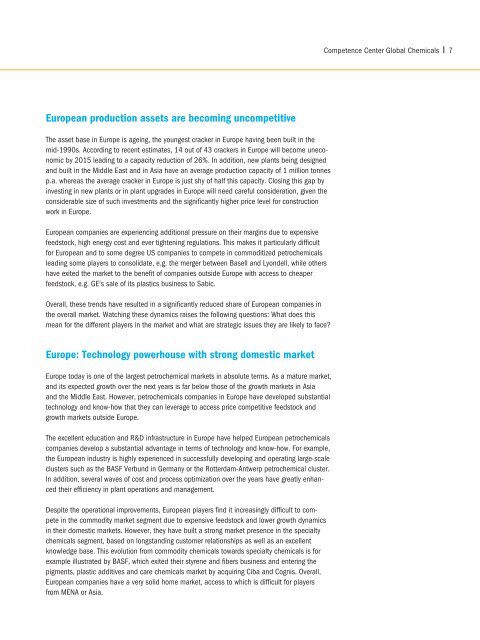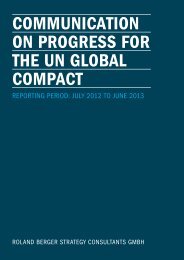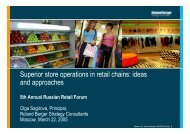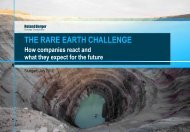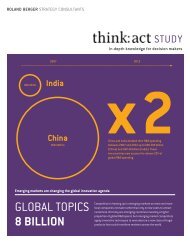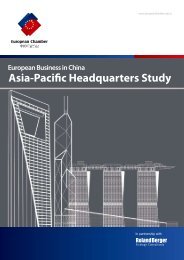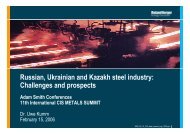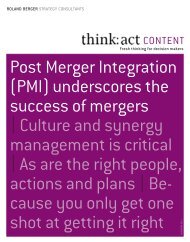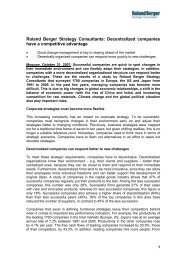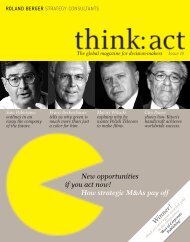Global petrochemicals - Roland Berger Strategy Consultants
Global petrochemicals - Roland Berger Strategy Consultants
Global petrochemicals - Roland Berger Strategy Consultants
- No tags were found...
Create successful ePaper yourself
Turn your PDF publications into a flip-book with our unique Google optimized e-Paper software.
Competence Center <strong>Global</strong> Chemicals 7European production assets are becoming uncompetitiveThe asset base in Europe is ageing, the youngest cracker in Europe having been built in themid-1990s. According to recent estimates, 14 out of 43 crackers in Europe will become uneconomicby 2015 leading to a capacity reduction of 26%. In addition, new plants being designedand built in the Middle East and in Asia have an average production capacity of 1 million tonnesp.a. whereas the average cracker in Europe is just shy of half this capacity. Closing this gap byinvesting in new plants or in plant upgrades in Europe will need careful consideration, given theconsiderable size of such investments and the significantly higher price level for constructionwork in Europe.European companies are experiencing additional pressure on their margins due to expensivefeedstock, high energy cost and ever tightening regulations. This makes it particularly difficultfor European and to some degree US companies to compete in commoditized <strong>petrochemicals</strong>leading some players to consolidate, e.g. the merger between Basell and Lyondell, while othershave exited the market to the benefit of companies outside Europe with access to cheaperfeedstock, e.g. GE‘s sale of its plastics business to Sabic.Overall, these trends have resulted in a significantly reduced share of European companies inthe overall market. Watching these dynamics raises the following questions: What does thismean for the different players in the market and what are strategic issues they are likely to face?Europe: Technology powerhouse with strong domestic marketEurope today is one of the largest petrochemical markets in absolute terms. As a mature market,and its expected growth over the next years is far below those of the growth markets in Asiaand the Middle East. However, <strong>petrochemicals</strong> companies in Europe have developed substantialtechnology and know-how that they can leverage to access price competitive feedstock andgrowth markets outside Europe.The excellent education and R&D infrastructure in Europe have helped European <strong>petrochemicals</strong>companies develop a substantial advantage in terms of technology and know-how. For example,the European industry is highly experienced in successfully developing and operating large-scaleclusters such as the BASF Verbund in Germany or the Rotterdam-Antwerp petrochemical cluster.In addition, several waves of cost and process optimization over the years have greatly enhancedtheir efficiency in plant operations and management.Despite the operational improvements, European players find it increasingly difficult to competein the commodity market segment due to expensive feedstock and lower growth dynamicsin their domestic markets. However, they have built a strong market presence in the specialtychemicals segment, based on longstanding customer relationships as well as an excellentknowledge base. This evolution from commodity chemicals towards specialty chemicals is forexample illustrated by BASF, which exited their styrene and fibers business and entering thepigments, plastic additives and care chemicals market by acquiring Ciba and Cognis. Overall,European companies have a very solid home market, access to which is difficult for playersfrom MENA or Asia.


